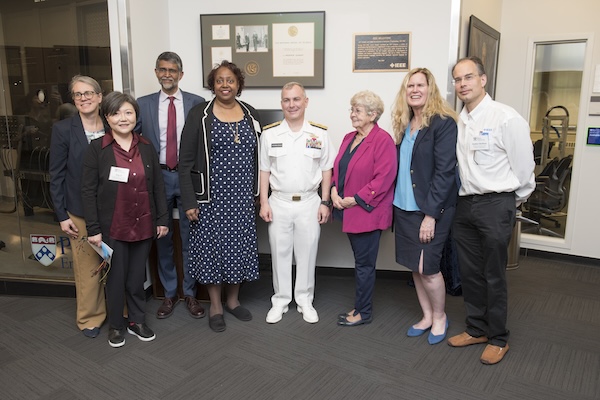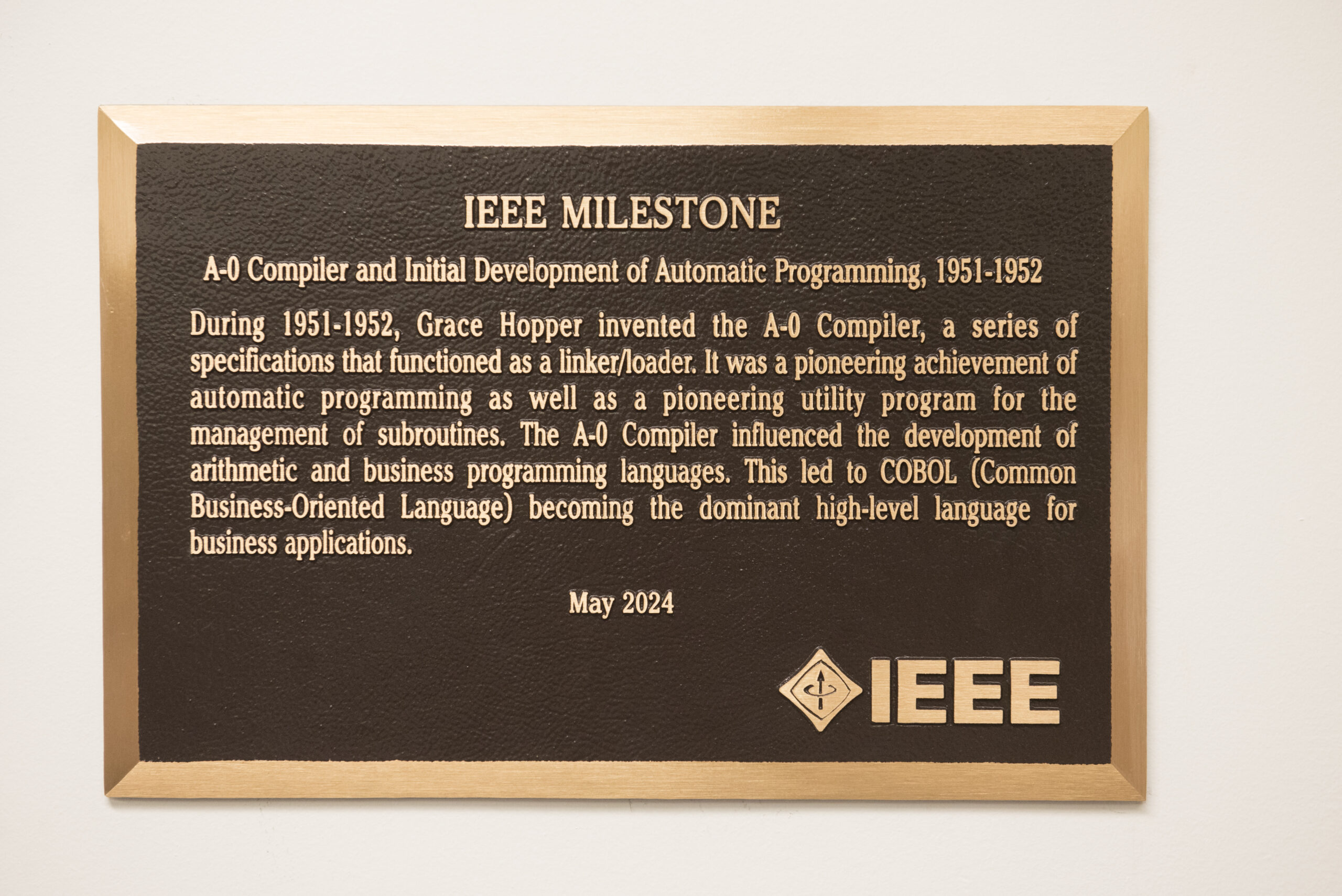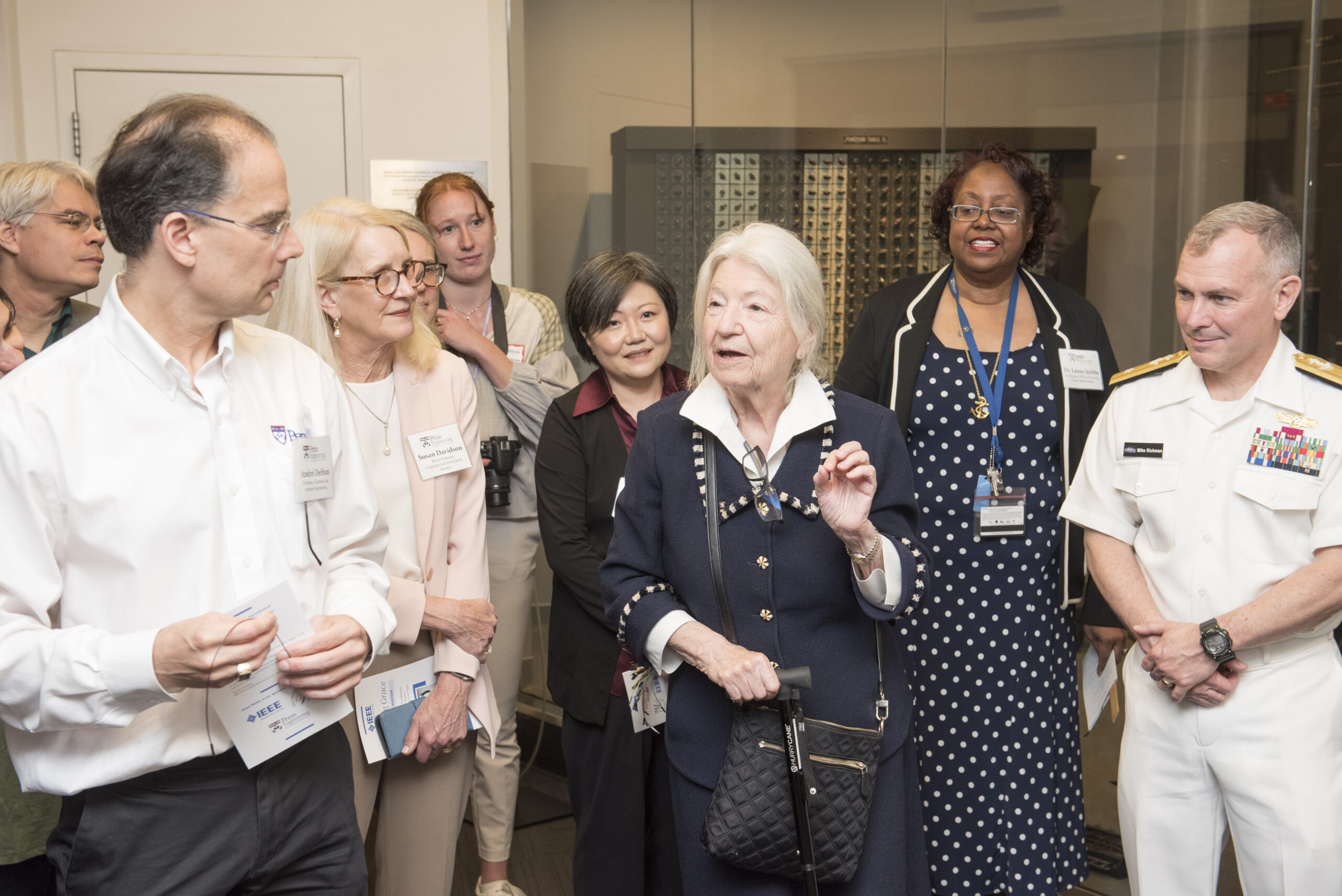
On May 7, the Institute of Electrical and Electronics Engineers (IEEE) dedicated an IEEE Milestone marker in recognition of the significance of the A-0 compiler, an early innovation in computer programming developed by Grace Hopper, the pioneering computer scientist who served as a lecturer at the University of Pennsylvania.
Today, programming languages resemble English. Words like “function” and “return” maintain their everyday meaning in popular contemporary languages like Python, Java and JavaScript.
Without the A-0 compiler, a crucial tool written by Hopper in the early 1950s, these advances in abstracting the complex processes that take place inside computers might not have been developed as rapidly as they were.
While working at the Eckert-Mauchly Computer Corporation (known today as Unisys), Hopper recognized a common problem when writing mathematical functions for computers.
“Programmers are lousy copyists,” she said. “It was amazing how many times a 4 would turn into a delta, which was our space symbol, or into an A—and even B’s turned into 13’s.”
The A-0 compiler created a “library” of such functions, any of which could be retrieved with a single command, reducing human error by using a symbolic term to abstract a complex process.
For Hopper, the A-0 compiler was an important step in the process of making programming more accessible to everyone. “We were also endeavoring to provide a means that people could use,” she said. “Plain, ordinary people, who had problems they wanted to solve.”

This IEEE Milestone, a plaque that will live in perpetuity at Penn Engineering, was made possible due to the efforts of Kathleen McDevitt, IEEE Philadelphia Section Vice Chair, and André DeHon, Professor in Electrical and Systems Engineering (ESE) and in Computer and Information Science (CIS). “This milestone celebrates the first step of applying computers to automate the tedious portions of their own programming. It is fitting to host this milestone at Penn from which the Eckert-Mauchly Computer Corporation was spun out and where she lectured,” said DeHon.
The dedication took place in the Moore Building, adjacent to the room that houses the Electronic Numerical Integrator and Computer (ENIAC), the world’s first general-purpose computer that was developed at Penn.
In a ceremony beforehand, speakers from Penn Engineering, the U.S. Navy and IEEE testified to the magnitude of Hopper’s accomplishments.
“Ms. Hopper enjoyed long and influential careers in the U.S. Navy and the computer industry,” said Vijay Kumar, Nemirovsky Family Dean of Penn Engineering, “including 15 years of teaching here as a lecturer in the School of Engineering and Applied Science, which we all take great pride in being part of our school’s history.”
Hopper enlisted in the Naval Reserves in her 30s, ultimately reaching the rank of rear admiral. When she retired in the 1980s, she was the oldest active-duty commissioned officer in the entire fleet, and received the Defense Distinguished Service Medal, the highest non-combat decoration awarded by the Department of Defense.

“Without Grace Hopper,” said Rear Admiral Michael Richman, the Navy’s Deputy Commander for Cyber Engineering, “the contours of our current Navy Mission, our digital transformation and the entire field of digital and cyber engineering would simply not exist as they are today.”
“She painted the picture for what computing would be like,” said Dr. Laura Stubbs, Senior Director in the Penn Engineering Office of Diversity, Equity and Inclusion, who also served in the Navy, attaining the rank of captain, and who met Hopper while teaching at the Naval Academy.
“Grace was an inspiration and a pioneering archetype of the computer engineer,” said Jing Li, Eduardo D. Glandt Faculty Fellow and Associate Professor in ESE and CIS. “She was a master of the physical machine and the ways to program them for both performance and human effort.”
“I’m a direct inheritor of the A-0 compiler, which sparked my entire field,” said Stephanie Weirich, ENIAC President’s Distinguished Professor in CIS.
“Our professions have a long, rich and important history,” added Kathleen Kramer, IEEE President-elect, “and it’s essential that the pioneering technological developments and discoveries and people behind them are preserved for generations to come.”
